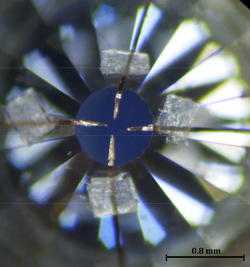
Campus Moncloa
Campus of International Excellence
Science under pressure: new future alternatives
For several decades now, the pressure has become important from the point of view of scientific production. Every day, there are more studies that involve novel aspects and progress related to the thermodynamic magnitude of high interest.
24/10/2012
For several decades now, the pressure has become important from the point of view of scientific production. Every day, there are more studies that involve novel aspects and progress related to the thermodynamic magnitude of high interest.

Picture taken through a microscope. A diamond of the anvil cell is observed on four gold wires placed manually that will act as electric contacts.
Author: Adrián Andrada Chacón (lthe laboratory of the High Pressure Group of the UCM).
This is the case of the study of pervoskite, inorganic solids with very interesting properties in the field of electronics, telecommunications and even energy storage. The study of this type of solids under high pressure helps us to understand its overall behavior, as a result they can modulate its properties and search for an interesting applicability.
In this sense, to research the electrical properties of these solids when are under high pressures (between 10,000 and 100,000 times the air pressure) becomes an interesting area of science to study. In these conditions, drastic changes are observed in the electric behavior of these substances in a way that, a solid initially insulating can become an attractive electrical conductor which has useful magnetic properties.
However, despite the interest of the research, it is needed to highlight an aspect that makes the research is even more interesting. It is not easy to carry out measurements of electrical properties of solids at high pressures. To do this, it is a must to conduct a work of instrumental development. In this sense, the research group has designed and optimized an instrumental device that allows them to performance measures of similar caliber.
The device is an anvil cell formed by two small cut diamonds whose tips are truncated, what results in two flat surfaces. When diamonds are faced and tightly compressed against each other, they generate the required pressure. Likewise, four slight gold wires are placed manually and with the help of a microscope on the flat surface of one of the diamonds (this surface usually has a diameter of 0.8 mm or less, what it shows the experimental difficulty in the technique).
This work, supported by a high manual component, can determinate the success of the experiment. The four gold wires arranged in a cross shape will be in contact the solid sample, located between the diamonds placed facing. Therefore, they will act as electrical contacts, useful to measure the electrical resistance of the solid studied and to register the right electrical properties.
The first measurements made with the device go towards a promising line of research which will provide results of high interest. For this reason, the pressure must remain a reference based on the applied and basic science.
Author of the article: Adrián Andrada Chacón
Tag: Materials for the Future Source: CEI Campus Moncloa
Event date:
24/10/2012
